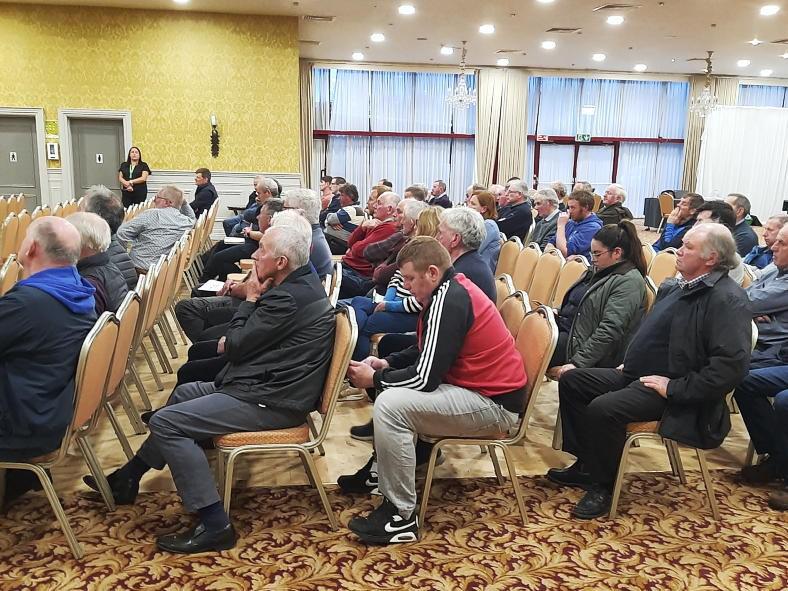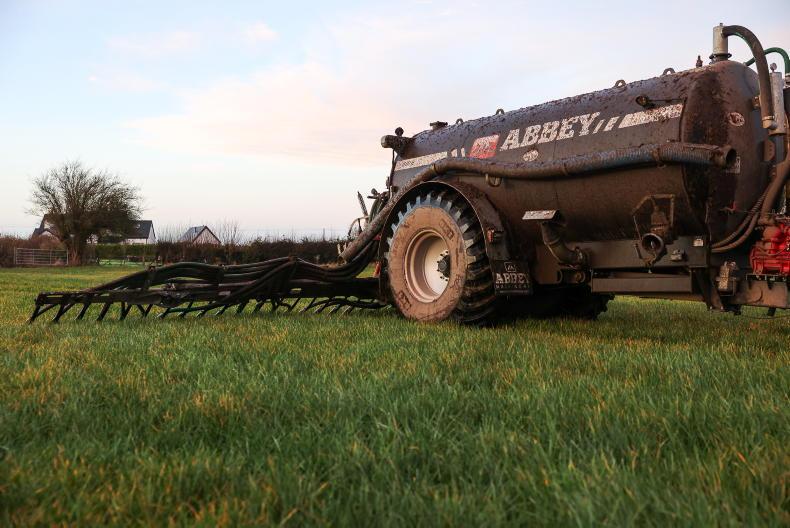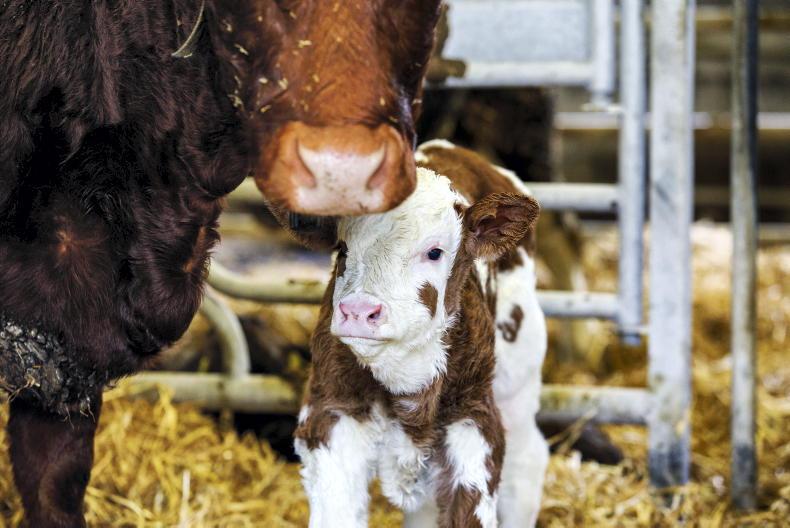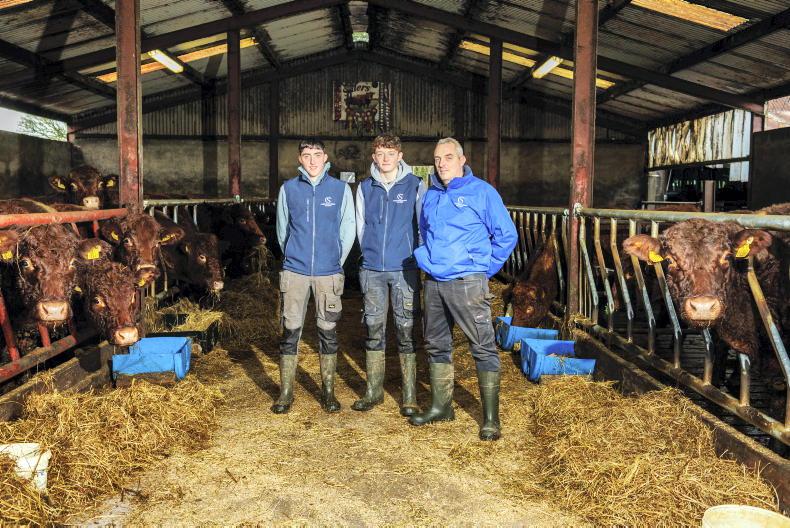More than 9,300 farmers have applied join the new Suckler Carbon Efficiency Programme (SCEP) to-date.
A Department of Agriculture meeting in Ballina on Wednesday heard that there has been a steady flow of applicants since the €260m scheme opened in late March.
While the Department’s David Buckley predicted that a surge in applications is likely before the 22 May closing date, he said it was still too early to say whether the target of 20,000 farmers will be met.
Buckley urged farmers who were considering joining SCEP to make their application as early as possible.
Star ratings of cows
One of the main talking points at the meeting – which was attended by around 80 farmers – was the changing star ratings of cows and the impact this would have on farmers joining the scheme.
Both Buckley and Seán Coughlan of the Irish Cattle Breeding Federation (ICBF) pointed out that cows which were originally rated as 4- or 5-star animals, but have seen their ratings fall recently, will be accepted into SCEP at their original higher evaluations.

David Buckley addresses the SCEP meeting in Ballina.
This concession prompted some discord from the floor, with a number of farmers asking if such a move was consistent with SCEP’s stated aims of breeding more efficient and profitable beef cattle.
However, Coughlan and Buckley defended the move.
Coughlan pointed out that star ratings for cows could not remain static as the genetic merit of the suckler herd as a whole improved. It was therefore unfair to penalise farmers just because the star ratings of some of their breeding stock had slipped.
“Where a farmer brings in a 4- or 5-star animal, I don’t think it’s fair that that farmer is penalised when the cow drops.
"What you want to make sure is that when the farmer is making the next decision, they are also making the best decision and choosing 4- and 5-star cows,” Coughlan said.
Coughlan pointed out that these cows and their progeny were likely to be culled from herd relatively quickly because of their reduced start ratings.
“It is very hard to breed the next replacement heifer off a 2-star cow and meet the requirements of the scheme,” he pointed out.
Absolute carnage
But the ICBF boss maintained that retrospectively penalising farmers because of genetic improvements in the national beef herd would not be fair or practical.
“I don’t think we could run a scheme like that, it would cause absolute carnage,” Coughlan told the meeting.
“We would rightly be accused of running away with ourselves and being totally theory-based and not dealing with the reality of what actually happens on farms,” he added.
This position was shared by Buckley who claimed that if the scheme sought to use cows’ more recent lower evaluations, the Department would be accused of being “blatantly unfair”.
BEEP scheme replacement
Meanwhile, the meeting heard that applications for Bord Bia's quality assurance scheme - membership of which is a requirement for SCEP - were taking three months on average to process to certification.
The meeting also heard that a scheme to replace the Beef Environment Efficiency Programme (BEEP) is likely to be launched later this summer.
The new scheme, which could have a budget of €28m, is expected to be a beef welfare programme. It is unlikely to open until July or August, and the required actions have not been specified.
More than 9,300 farmers have applied join the new Suckler Carbon Efficiency Programme (SCEP) to-date.
A Department of Agriculture meeting in Ballina on Wednesday heard that there has been a steady flow of applicants since the €260m scheme opened in late March.
While the Department’s David Buckley predicted that a surge in applications is likely before the 22 May closing date, he said it was still too early to say whether the target of 20,000 farmers will be met.
Buckley urged farmers who were considering joining SCEP to make their application as early as possible.
Star ratings of cows
One of the main talking points at the meeting – which was attended by around 80 farmers – was the changing star ratings of cows and the impact this would have on farmers joining the scheme.
Both Buckley and Seán Coughlan of the Irish Cattle Breeding Federation (ICBF) pointed out that cows which were originally rated as 4- or 5-star animals, but have seen their ratings fall recently, will be accepted into SCEP at their original higher evaluations.

David Buckley addresses the SCEP meeting in Ballina.
This concession prompted some discord from the floor, with a number of farmers asking if such a move was consistent with SCEP’s stated aims of breeding more efficient and profitable beef cattle.
However, Coughlan and Buckley defended the move.
Coughlan pointed out that star ratings for cows could not remain static as the genetic merit of the suckler herd as a whole improved. It was therefore unfair to penalise farmers just because the star ratings of some of their breeding stock had slipped.
“Where a farmer brings in a 4- or 5-star animal, I don’t think it’s fair that that farmer is penalised when the cow drops.
"What you want to make sure is that when the farmer is making the next decision, they are also making the best decision and choosing 4- and 5-star cows,” Coughlan said.
Coughlan pointed out that these cows and their progeny were likely to be culled from herd relatively quickly because of their reduced start ratings.
“It is very hard to breed the next replacement heifer off a 2-star cow and meet the requirements of the scheme,” he pointed out.
Absolute carnage
But the ICBF boss maintained that retrospectively penalising farmers because of genetic improvements in the national beef herd would not be fair or practical.
“I don’t think we could run a scheme like that, it would cause absolute carnage,” Coughlan told the meeting.
“We would rightly be accused of running away with ourselves and being totally theory-based and not dealing with the reality of what actually happens on farms,” he added.
This position was shared by Buckley who claimed that if the scheme sought to use cows’ more recent lower evaluations, the Department would be accused of being “blatantly unfair”.
BEEP scheme replacement
Meanwhile, the meeting heard that applications for Bord Bia's quality assurance scheme - membership of which is a requirement for SCEP - were taking three months on average to process to certification.
The meeting also heard that a scheme to replace the Beef Environment Efficiency Programme (BEEP) is likely to be launched later this summer.
The new scheme, which could have a budget of €28m, is expected to be a beef welfare programme. It is unlikely to open until July or August, and the required actions have not been specified.











SHARING OPTIONS